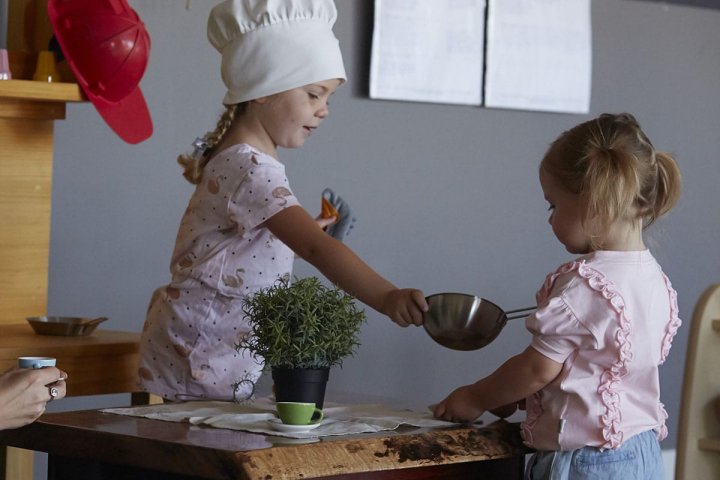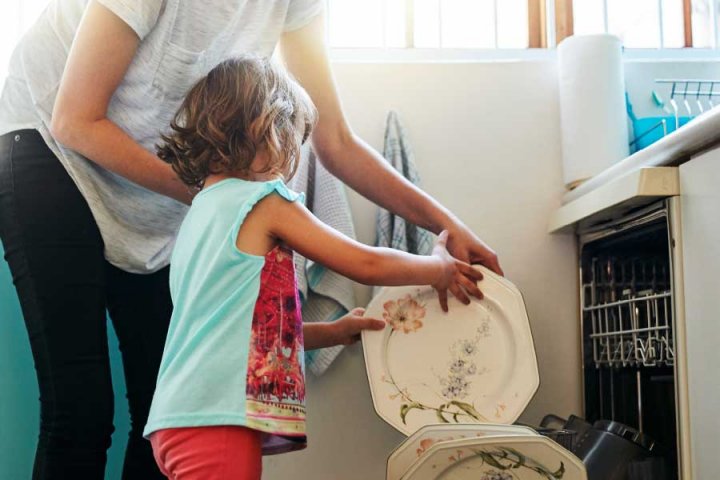Have You Asked Yourself "What is Important for a Child?"
The first five years of a child are the most important childhood years of his life. This is the age when he starts to experience things, people, the environment, and, most importantly, relationships. These pre childhood years are the foundation stone of the adult he would become and shape the future aspects of your child’s growth, health, learning, development, and happiness as they slowly become a part of the community and society.
Various studies and researches have shown that the first three years are the most important in shaping a child’s brain structure, which becomes the base for the development and learning throughout their life. Since infancy to about 12 years of age is deemed as the childhood age and there are various phases of it; parents should understand that the child is regularly going through a transition period from home to pre-school, then to school while he is trying to understand and learn many things with a million questions in his mind.
Before we understand what makes your child happy, we should understand the basic needs and psyche of a child based on the environment and circumstances they are brought up in.
Things to Look Out for When You're Trying to Understand Your Child
Few important points which would be helpful for parents to have a better understanding of their kids are – observing the daily habits and activities of your child to understand about their personality, spending quality time with your children during the day and having small conversations with them, paying undivided attention to your child and talk to them for a few minutes every day so that they feel that you care for them.
You don’t miss out on the important insights they may give about themselves, equally important is to be aware of your child’s environment and the ambience in which they socialize, another important part is to understand how a child’s brain function as it can help you know how they perceive things and people around them and what factors influence their decision making, behavior, cognitive and logical abilities and listen to your children and focus on their expressions, tone, and body language.
While kids express them in different ways, you can help them with this aspect of their personality; and it can blossom in drawing, writing, acting, singing, and painting, etc. Similarly, few children may love to write their diary or maintain a journal, scrapbook, etc., and you can educate them about the right way to do that.
Asking the right questions to your kids can help them to better express themselves. Try to ask open-ended questions instead of questions that close with a ‘yes’ or a ‘no’. Also, don’t skip their questions as kids have millions of questions encircling them, so take out time and answer as many as you can. Dodging a query will only discourage them from asking any more questions in the future.
What Makes a Child Happy: Tips for Keeping a Healthy Parent-Child Relationship
As is obvious, raising a happy child requires some serious effort on your part as a parent, and there are certain aspects that should be taken care of to imbibe happiness as a trait in the persona of your child. Very few parents emphasize the emotional quotient of their child while they try to focus on the IQ levels. EQ is the child’s ability to recognize and express their emotions while having the ability to control them. You need to nurture this trait in your child by understanding his nature as few children are outspoken, while others can be a bit shy by nature.
Before we move on to the most important points which make your child happy, it’s essential to set the right expectations from your child. A little comparison with other children is fine but never show it in front of him as he may have his own abilities and natural gifts, and uneven comparing will not lift his spirits. Instead, he may become a victim of low self-esteem and an inferiority complex.
Understand the things which they like, and instead of assuming that everything is fine if they are not complaining, have regular conversations with them. Having said that, the whole exercise to make your child happy is not about making him happy for a short while; but to develop qualities, habits, and behavior that would make him a happy child today and a vibrant adult tomorrow. Let’s check a few of the important aspects which a parent should constantly imbibe and monitor to make their children happy and stress-free.
Encourage Building Relationships
Making your child feel connected to his family members, neighbors, friends, and schoolmates and even to the pets at home is a proven way to promote your child’s emotional well being for a lifetime. Fostering connections is helpful for the child to understand the feelings of being loved, acknowledged, and wanted and acts as the strongest protector against distress, negative thoughts and can keep away risky behavior, including indulgence in smoking and drinking, etc.
Social connections help the child to mix well in society and understand the behavior and expectations of different people. Parents must ensure that the children are emotionally well connected to them in the best possible manner and shouldn’t be looking for solace somewhere else during tough times.
Let Happiness Come Naturally
While putting efforts to keep a child happy is part of parenting, you must focus on keeping them happy in the long term and stop trying to bow down before every wish and desire of your children for their short term happiness. For example, eating chocolates and junk food can give short term happiness to your child, but refraining from these food habits and eating healthy food will provide long term health goals resulting in long term happiness for your children.
Don’t try to suppress the feelings of sadness, anger, or frustration, rather allow them to express their emotions freely and let them understand that this is a part of a normal person’s life. You shouldn’t try to give artificial happiness by hiding or lying about real situations and let them develop the resilience and coping skills to fight back during a gloomy situation or even worst, a setback.
Happy Parents Have Happy Kids
Get a little bit selfish and start loving yourself first before you start loving your kids because only a happy parent can raise a happy kid. If you are in a negative mindset, that would certainly reflect in your behavior and will impact your kid too. So, first and foremost, part of happy parenting is to become satisfied with yourself as your kid wouldn’t be happy seeing his parents depressed, distressed, or angry. Hence, before you think about the emotional well being of your child, you must pay attention to your own mental, emotional, and physical well being to become a doting and proud parent.
Appreciate the Good Things
Who doesn’t like praise, right? It’s the very nature of humans to feel good about them when someone appreciates anything about you or any work done by you. The same logic applies to children as well, you would be happy to see the smile on their face when you praise them for little things, it may be a small drawing or the child keeping their stuff at the right place.
Be vigilant not to praise the physical traits like beauty or skin color etc. as they don’t hold a long term happiness quotient. Instead of honoring the result and achievement, appreciate them for qualities like hard work, perseverance, persistence, and creativity, etc. as they may always not get the same results, but would remember that they have the traits imbibed in them and will get the strength to bounce back.
Failure and Success are Two Sides of the Same Coin
This is a mantra which you need to give your child once he starts understanding about the endless ‘win and lose’ game of life. Till about 4 years of age, whatever your child is learning and doing is for the first time in their life, be it walking, dress and feed themselves or learning alphabets. This is the time when you should allow them to do their own thing while observing so that they can utilize their full potential in the small tasks.
They may fall and learn to get up again while playing or doing a daily chore, but this way, they will understand the importance of ‘I can’ spirit and will develop important traits like courage and optimism. After 5 years of age, you can make your child aware of win and lose concept through small games and stories.
Give Them Responsibilities
Make your child feel valued by providing him some real-life responsibilities like keeping the clothes in the wardrobe, putting the garbage in the bin, placing the utensils on the dining table before meals, or taking care of his baby sister while you complete other chores. This way, he will feel that he matters in the family and would start learning about taking accountability for small works in the house. Once your child starts learning about his contribution to the household works, he will develop traits like association and confidence, which are two important traits for long term happiness goals.
Make Happiness a Habit
Children are like soft clay, and they can be molded the way you want. Taking advantage of this quality of children, you can imbibe small happiness habits in them so that with time, being happy becomes a part of their nature. Few impactful methods to build lasting happiness habits in kids are – getting distractions and temptations away, declaring in public about the happiness goals you have set for your child to get social support, taking one step at a time, i.e., inculcating one happiness habit at a time and allowing sometime before it gets perfected. Few happiness habits can be reading books daily, exercising, prayer, and one act of gratitude every day.
Importance of Self-discipline
Once your kids attain perfection with some responsibilities, you should start sowing the seeds of self-discipline in them. Educate them about the importance of self-discipline, but first, you need to inculcate the same in your behavior. If you are throwing trash on the floor instead of the dustbin, then don’t expect kids to be self-disciplined enough to use the bin. As a parent, you need to lead by example when it comes to developing the habit of self-discipline in your child. Small acts like keeping the plates in the sink after meals, keeping the study table neat and arranged, etc. lay the foundation of self obedience in your kids and stay with him for the rest of his life.
Develop the Habit of Playing Outdoors
Feeling relieved while your child is glued to the mobile, TV, or computer screen and thinking that they are playing or getting entertained is definitely not a healthy and long term happiness habit. You wouldn’t want this happiness habit to be embedded in your children, so before they get habitual of mobile games or get addicted to the internet; encourage and, if required, involve yourself in playing outside with your child. Video games, cartoons, or TV are okay for a few minutes, but they can’t replace the competitive spirit, physical endurance, and other benefits that are achieved by playing outdoor games.
-
 Learn How to Make Your Own Chemical Free Slime without Borax and Keep the Kids Engaged for Hours: 8 Recipes for Borax Free Slime, 3 of Them Edible! (2020)
Learn How to Make Your Own Chemical Free Slime without Borax and Keep the Kids Engaged for Hours: 8 Recipes for Borax Free Slime, 3 of Them Edible! (2020)
-
 Farm Toys to Grow the Creativity of the Little Farmer in 2020: Your Kids Will Love These 10 Exciting Farmhouse Toys
Farm Toys to Grow the Creativity of the Little Farmer in 2020: Your Kids Will Love These 10 Exciting Farmhouse Toys
-
 Looking for Cool Toys on a Budget to Keep Your Little Ones Creatively Engaged? Our Curated List of Top 10 Toys on a Budget Will Delight Your Children and Help Their Development Too (2020)
Looking for Cool Toys on a Budget to Keep Your Little Ones Creatively Engaged? Our Curated List of Top 10 Toys on a Budget Will Delight Your Children and Help Their Development Too (2020)
-
 Make Screen Time Count: 10 Educational Games for Kids Online That Improve Cognitive Skills & Sharpen Your Child's Mind
Make Screen Time Count: 10 Educational Games for Kids Online That Improve Cognitive Skills & Sharpen Your Child's Mind
Make it a Habit to Eat Together with Your Children in Your Initial Years!
Try to have at least one meal in a day when the entire family is sitting together and enjoying the food; have small chitchats and gossips before and after your food. These small conversations over the dinner table imbibe a sense of belongingness and strengthen the child-parent relationship.
























 Highlight the Best Facets of Your Incomparable Beauty: Discover the Best Face Highlighter Currently Available in India and Everything You Need to Know About Using Face Highlighters for Maximum Effect (2023)
Highlight the Best Facets of Your Incomparable Beauty: Discover the Best Face Highlighter Currently Available in India and Everything You Need to Know About Using Face Highlighters for Maximum Effect (2023)
 Forget the Blemishes and Get that Picture Perfect Flawless Radiance on Your Face: Check out the Best Foundations for Oily Skin Currently Available in India and Everything You Need to Know About Makeup Foundations (2023)
Forget the Blemishes and Get that Picture Perfect Flawless Radiance on Your Face: Check out the Best Foundations for Oily Skin Currently Available in India and Everything You Need to Know About Makeup Foundations (2023)
 Make Your Presence Felt Wherever You Go: Discover the Best Perfumes Under 2000 for Both Men and Women to Announce Your Arrival and Make Any Occasion Memorable (2023)
Make Your Presence Felt Wherever You Go: Discover the Best Perfumes Under 2000 for Both Men and Women to Announce Your Arrival and Make Any Occasion Memorable (2023)
 Protect Your Oily Skin from the Harmful Rays of the Sun: Discover the Best Gel Based Sunscreens for Oily Skin and Everything You Need to Know Before Buying One (2023)
Protect Your Oily Skin from the Harmful Rays of the Sun: Discover the Best Gel Based Sunscreens for Oily Skin and Everything You Need to Know Before Buying One (2023)
 Minor Blemishes and Wrinkles Affecting Your Confidence? Check out the Best BB Creams to Conceal Your Worries and Nourish Your Skin to Restore the Healthy, Radiant and Glowing Complexion Back Again (2023)
Minor Blemishes and Wrinkles Affecting Your Confidence? Check out the Best BB Creams to Conceal Your Worries and Nourish Your Skin to Restore the Healthy, Radiant and Glowing Complexion Back Again (2023)
